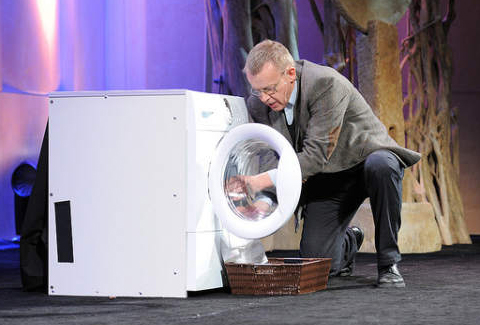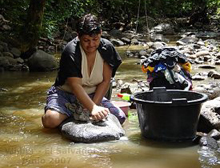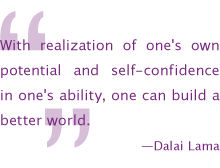Throughout our daily routines of eating a meal, getting dressed, brushing our teeth and reading, we tend to forget to appreciate that all of these are benefits of living in a developed country. This concept was brilliantly demonstrated in the story told by Professor Hans Rosling, at TEDWomen in Washington DC in December 2010, about living above the economic washing machine line. The impact of increasing our carbon footprint is obvious if everyone lives above this line, although it would no doubt be an exceedingly rare individual who would be willing to forgo the benefits a washing machine brings to one’s life by providing us the leisure time to do things like read books.

This was just one of the many stories related at TEDxGranta in Cambridge on 15th of February 2011. The inspirational design of the Møller center was an appropriate setting for the first TED event held in Cambridge, a full day dedicated to listening to people who had ideas worth spreading. The breaks were devoted to engaging one-on-one with the other attendees and speakers in a glass-wrapped room that appeared to suspend us out over the bucolic fields surrounding the campus. The secluded setting allowed us to pause long enough in our daily tasks to gain a fresh perspective.
The organizers gathered twelve people from the Cambridge area who had great stories to tell about the impact that their individual efforts had in the world. Interspersed were videos of presenters from TEDWomen. Collectively the stories questioned, prodded, nudged, demanded, and even reassured and motivated us by proving that an individual can make a difference. Each presenter demonstrated that by focusing on the possibilities, he or she was able to find solutions to the invariable obstacles they encountered, while acknowledging that it may feel at times as if our efforts seem insignificant or hopelessly mired in bureaucracy, or we may feel like we are rowing in circles. What each story underscored was that it is the idea followed by the first step and then by the steady application of our efforts that can make a positive impact in the lives of those around us. The idea alone is not enough. We all know too well how easy it is as we sit in the comfort of our armchairs to shrug things off as “somebody else’s problem”. What is essential is the first step.
Each presenter’s story was about his or her efforts to change the status quo for the better. Some did it by smashing the shackles of poverty and eradicating erroneous perceptions, which subjugate. Others did it by creating programs that brought the opportunity to learn to young girls in Africa, or by challenging our notion of what is public art, or by questioning the impact of pesticides, or the way in which we raise our sons, or invest our money. Sarah Outen’s story of rowing alone across the Indian Ocean was one of personal perseverance against all odds. She talked about the frustration of literally rowing in circles.
We were reminded that the essential freedoms from want and fear, of speech and of the pursuit of happiness belong to all.  We were challenged to think with open minds and to take personal responsibility for our share of the task to eradicate injustice, to provide opportunity and hope, to do what we can to make this a better world. After all, everyone wants to live above the economic washing machine line.
We were challenged to think with open minds and to take personal responsibility for our share of the task to eradicate injustice, to provide opportunity and hope, to do what we can to make this a better world. After all, everyone wants to live above the economic washing machine line.
Who do you know who has changed the world for the better? Have you?
For more information about TEDxGranta click here.
